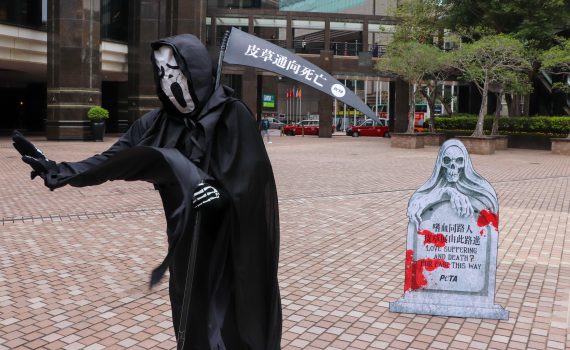Policy Address 20/21: Property agents welcome but remain skeptical towards commercial property tax abolition
- By: Zhu Zijin Cora 朱子槿、Vikki Cai Chuchu、Yoyo Kwok Chiu TungEdited by: Kawai Wong、談 巧童
- 2020-11-25
The city's leader announced today to abolish tax for commercial properties, real estate agents express positive attitudes towards the policy but some of them cast doubt on its effectiveness due to the uncertain investment environment under COVID-19.
In her fourth annual policy address, Chief Executive Carrie Lam Cheng Yuet-ngor said the government will abolish the Double Stamp Duty (DSD) on commercial property to facilitate businesses to cash out by selling non-residential real estate so to stay afloat during the economic downturn. The policy will take effect tomorrow.
"As a result of the economic downturn and uncertainities surrounding the COVID-19 pandemic, prices and demand for non-residential properties have been dropping over a period of time," said Ms Lam. "The government considers now the right time to abolish the DSD imposed on non-residential properties."

Hong Kong saw its Q3 GDP decrease by 3.5% in real term on a year-on-year basis. For the net output in the real estate, professional, and business services sector, it decreased by 5.9% in real terms in 2020 Q2 from a year earlier, following a decline of 4.6% in Q1, according to the Census and Statistics Department.
The DSD, formally known as the Doubled Ad Valorem Stamp Duty, was first introduced in February 2013 to deal with the surging prices of commercial properties. The rates range from 4.25% to 8.5% depending on different asset prices.
Lau Kin-ling, 59, a real estate agent said the abolishment of commercial property tax is helpful for the market but it is hard to predict the effectiveness.
"The policy may not attract a considerable amount of mainland investors since the borders remain closed," said Ms Lau. "The major factor for buyers to purchase a commercial property is field visit so that they can access the actual environment, simply presenting an advertising video would not be trust-worthy," she added.
Sze Ming-yu, chairperson of the Hong Kong Real Estate Agencies General Association said buyers may not be very active to enter the market because of the undesirable economic situation amid the pandemic. However, she thinks the abolition is good for the industry in general.
"Some members have already asked about the prices of commerical properties and I expect the transcation deals to increase by 20% to 30% tomorrow," Ms Sze said.
Despite the skepticism, the tax cut still receives some positive responses.
Jeffrey Lam Kin-fung, lawmaker and member of the Business and Professionals Alliance for Hong Kong said at a press conference today, "This policy means the government is willing to get through the difficult times with the business sector. We believe this policy enables SMEs to flexibly mobilise capital, ease the burden on turnover."

Daniel Wong, CEO and Executive Director of Midland IC&I Limited welcomes the levy cancellation.
"This policy is absoutely beneficial for commerical property users and the attraction of funds," Mr Wong said in a press release. "The commercial property market in Hong Kong has been hard-hit by COVID-19."
"For industrial buildings, only 13 transcations (valued at HK$100 million or more) were recorded in the first three quarters of this year with a year-on-year 60% drop," he added. "Vacancy rate of grade A office in Sheung Wan, Central, and Admiralty hit the highest record since the financial crisis in 2008, while the vacancy rate of shops in Tsim Sha Tsui, Mong Kong, Causeway Bay, and Central in Q3 was unprecedentedly high."

Travis Ng Ka-ho, associate professor from the Department of Economics from the Chinese University of Hong Kong, said the DSD is a distortionary policy and it had impeded transactions.
"You expect more transcations without [without DSD]," Prof Ng said, adding that the abolition would benefit the entire market as a whole with participants "on the buy-side and the sell-side going forward."
The DSD abolition was foreshadowed in August when the Hong Kong Monetary Authority (HKMA) relaxed the loan ceiling for commercial properties to 50% from 40% to allow buyers to borrow more money to purchase non-residential properties.
Earlier in the 2020 budget, Financial Secretary Paul Chan Mo-po rolled out a special 100% Loan Guarantee under the SME Financing Scheme, aimed to ease the economic burdens of small and medium enterprises.
Anti-epidemic Fund measures took immediate effect on 29 May 2020. The measure will last for 12 months, including raising the maximum loan amount of the 80% and 90% Guarantee Products and extending the eligibility coverage to the public companies in Hong Kong.
《The Young Reporter》
The Young Reporter (TYR) started as a newspaper in 1969. Today, it is published across multiple media platforms and updated constantly to bring the latest news and analyses to its readers.

Policy Address 20/21: A report not for our citizens": Hong Kong Pro-democrats criticise latest policy address

Policy Address 20/21: HK government to introduce cash allowance for low-income families




Comments